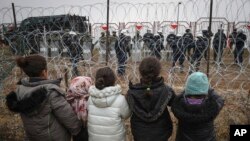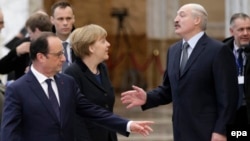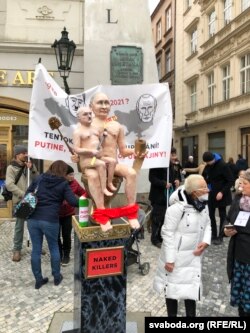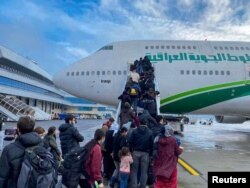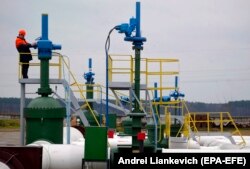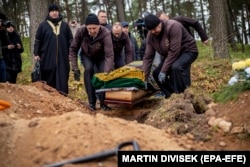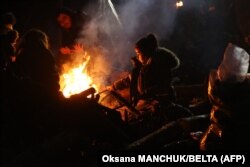With Belarus’ removal of hundreds of illegal migrants from its border with Poland, Polish Deputy Interior Minister Maciej Wasik on November 17 declared Alyaksandr Lukashenka the apparent loser of the months-long “border battle” with the European Union, an onslaught the EU claims was intended to undermine its stability.
But not everyone sees the EU as the ultimate winner of this “battle.” Regional analysts interviewed by Current Time identified four ways in which Minsk has made or could still make key gains against the 27-country bloc.
1. Conversations With Angela Merkel Implied Legitimacy
The November 15 and 17 phone calls between Acting German Chancellor Angela Merkel, the outgoing leader of the EU’s most powerful member, Germany, and Belarus’ Lukashenka about the migration crisis were the first between the 67-year-old politician, whom the EU no longer recognizes as Belarus' president, and a European leader in over a year.
The EU has implemented a series of sanctions against 166 Belarusian individuals and 15 entities for brutal crackdowns against Belarusians who claimed that the country's 2020 presidential elections were rigged in Lukashenka’s favor. It views the thousands of migrants heading from Belarus to Poland, Lithuania, and Latvia as a "hybrid attack" by Lukashenka in retaliation.
Although the European Commission, the EU’s executive branch, stresses that nothing has changed in that assessment, Belarusian mainstream media, despite Brussels' denials, depicted the Merkel-Lukashenka conversations as de facto EU recognition of Lukashenka as Belarus’ legitimate ruler.
The state-run BelTA news agency claimed on November 17 that Merkel and Lukashenka had agreed that to tackle the crisis “at the level of Belarus and the EU” and to appoint officials “who will immediately enter into negotiations in order to resolve the existing problems.”
Lukashenka spokeswoman Natalia Eismont went still further, asserting that Germany had agreed to accept 2,000 of the migrants via a “humanitarian corridor.”
European Commission spokesman Eric Mamer on November 18 categorically rejected these reports, telling a news briefing that there is “no question of negotiating with the Lukashenko regime” over the migrants, and that Germany and other EU member states can “have bilateral contacts with anyone they wish.”
The EU’s own official discussions on the crisis will be limited to “technical talks” with relevant United Nations bodies, the International Organization for Migration, and “their Belarusian counterparts” about the repatriation of migrants and provision of aid for those still at the Polish border, Mamer said.
But the regional perception already had been formed that the EU was willing to contemplate official contact with Lukashenka to defuse the crisis.
On November 16, Agnieszcka Legucka, an analyst at The Polish Institute of International Affairs, a Warsaw think-tank specializing in eastern European security issues, commented that public opinion in Poland and the Baltic states holds that the EU is giving in to Lukashenka’s “blackmail.”
Calling the first Lukashenka-Merkel discussion “a serious disappointment,” the head of Estonia’s parliamentary foreign affairs committee, Marko Mihkelson, described the conversation to ETV, a public broadcasting channel, as apparently at odds with the EU’s decision not to recognize Lukashenka as Belarus’ head of state.
Hearing from the West that it desires a compromise, Lukashenka “sensed that they are weak and showed them what he thinks,” charged Polish Foreign Ministry spokesman Lukash Yasin. “Lukashenka behaves like gangsters: When they see that others are weak, they prove to them that they will do more and more.”
Although EU officials have since repeated their condemnation of Minsk for allegedly organizing the migrants’ appearance on the Belarusian, Latvia, and Lithuanian borders, that message has been overshadowed by speculation over what Merkel and Lukashenka discussed.
2. Underlining EU Disunity, To Russia’s Delight
Interviewed shortly before the initial Merkel-Lukashenka phone call, former Ukrainian Foreign Minister Pavel Klimkin fumed that the EU agreeing to demands from Lukashenka for financial assistance with the migrant crisis or for direct talks would signal that “the EU’s foreign policy is finished.”
Terming Lukashenka a “dictator” and “liar,” Poland has refused to honor any agreements reached between Merkel and Lukashenka without its consent.
“We’re criticizing this [November 15 phone call] not just to criticize,” commented Polish analyst Legucka. “The Poles are criticizing because there was no agreement between Merkel, Poland, and the Baltic countries about how to regulate this crisis.”
Germany sidelining Poland to set up the call with Lukashenka “would make a good impression on [Russian President Vladimir] Putin,” Estonia’s Mikhkelson emphasized.
Russia agrees with Belarus, with whom it plans closer economic and military integration, that the EU encouraged protests against Lukashenka's official reelection and has brushed off Minsk and Moscow's objections.
But now, the thinking goes, Merkel has shown that the EU, though often seen as a regional counterweight to Russia, needs both Russia and Putin.
Less than a week before her Lukashenka conversations, Merkel consulted with the German-speaking Russian leader on November 10 and November 11 about the migration crisis. Putin urged direct talks with Lukashenka, the Kremlin reported. Russian Foreign Minister Sergei Lavrov already had urged EU payments to Belarus to meet the migrants’ needs.
On November 17, the last day of the Merkel-Lukashenka calls, the European Commission announced plans to provide 750,000 euros ($793, 624) to the International Federation of the Red Cross and Red Crescent Societies and “humanitarian partner organisations” to supply the migrants with food, hygiene kits, blankets, first aid kits, and other assistance.
Belarus began sending buses that withdrew an estimated 1,000 migrants to a regional government shelter that same day. From the site, BelTA displays photos of migrants, primarily children, who have refused to return home.
Over 400 Iraqi migrants, though, opted to return home on November 18 in a repatriation flight.
President Putin now “should be satisfied to the max,” commented Pavel Slunkin, an analyst for the European Council on Foreign Relations think tank and former first secretary in the Belarusian Foreign Ministry's European department.
“If it’s not possible to secure the borders of the European Union without Russia, then this only plainly indicates how capable the European Union is, in general, to act as a geopolitical player in the region,” Slunkin commented.
3. Saving Face Courtesy Of The EU Budget
The European Commission's decision to help fund humanitarian relief for the migrants gave Belarus a way to avoid assuming all financial responsibility for the estimated thousands of migrants it now hosts, including, in some cases, even within Minsk's underground pedestrian passageways or on its sidewalks.
Minsk has also begun to appeal for assistance from the United Nations and other international organizations.
That assistance could prove critical: Although Belarus' economy has posted slight growth for 2021, inflation, payments on debt to Russia, and sanctions that target some of its most viable economic sectors, such as exports of potash fertilizers and oil products. The impact could range as high as 13 percent of annual Gross Domestic Product, independent experts estimate, the Valdai Discussion Club reports.
With nearly $800,000 in the offing for providing for these migrants whom, the EU charges, Belarus itself brought in from the Middle East, Africa, and beyond, Minsk can now rest easier, analysts say.
At the same time, although the migration standoff has led to the EU considering a fifth set of sanctions against Belarus -- likely targeting airlines and travel agencies that facilitated the migrants’ travel -- Lukashenka has shifted the international community’s dialogue away from the Belarusian opposition’s demand for new presidential elections and punishment for Minsk’s imprisonment of political critics, Slunkin stressed.
Already, he has shown the EU what problems can be created for the bloc should its sanctions continue, the analyst said.
4. Probing Other EU Weak Spots
Energy, some observers predict, could be that next problem.
As the EU announced plans for a fifth set of sanctions against Belarus, Lukashenka on November 15 threatened to block natural gas supplies from Russia to Poland and Germany via the Yamal pipeline, a 4,107-kilometer (2,552-mile)-long conduit. Putin, however, publicly objected to such a move.
Nonetheless, on November 17, Belarus “slightly reduced” the Russian crude oil running through a much smaller pipeline, Druzhba (Friendship), to Poland and Germany, the pipeline’s Polish operator, PERN, said, OilPrice.com reported. The term of the reduction is unclear as yet.
On November 18, Belarus also stopped electricity supplies to Ukraine, an EU aspiring member that also has not recognized Lukashenka as president and harbors Belarusian dissidents. The Belarusian Energy Ministry stated that it will “consider” electricity supplies to Ukraine “depending on technical capabilities,” BelTA reported.
Belarus attributed the Druzhba reduction to unplanned repairs, but no official reason was given for the Ukrainian halt.
For Kyiv-based Belarusian economist and opposition politician Yaroslav Romanchuk, however, the Druzhba excuse was a sham “since it was unexpected also for Russia.”
“I think that it’s part of the hybrid war, the hybrid pressure put on Europe to force them to accept Lukashenka’s agenda,” Romanchuk asserted.
With the EU already facing skyrocketing energy prices, such a tactic could further the bloc’s economic vulnerability.
Smuggled narcotics could provide another tool for Lukashenka, believes former presidential administration official Anatoly Kotov, citing Lukashenka’s May threat to flood the EU with migrants and narcotics for its alleged interference in Belarusian domestic matters.
“The migration crisis will end, the narcotics crisis will begin,” predicted Kotov, who formerly worked on Lukashenka’s presidential policy toward Poland.
A new report by the European Council, the body made up of the EU’s 27 heads of state or government, identifies Belarus, Azerbaijan, and Ukraine as “warehouses” for smuggled heroin bound for the EU, the European Observer reported on November 17.
The U.S.-funded Global Organized Crime Index ranks synthetic drugs as Belarus’ “fastest-growing criminal market,” with “larger transnational networks” marketing the drugs online.
As yet, however, no concrete proof that Lukashenka has begun to “flood” the EU with narcotics has gone public.
Next Steps For The EU
Diplomacy is not a word that interviewed regional analysts and politicians use when advising how the EU should respond to the migration crisis.
“In reality, only a tough EU position can force [Lukashenka] to backtrack, and [that position] has been demonstrated,” said Kotov.
Both Kotov and Lithuania’s European Parliament deputy Petras Austryavichus advised additional sanctions beyond those now under consideration; in particular, on Belarus’ banking operations, said Austryavichus.
Such a move would show that Belarus’ migration stratagem had failed, and “reveal Lukashenka’s real face,” the two advised.
Belarusian political analyst Dzmitry Bolkunets advocates sanctions on cargo transit to the EU; the bloc ranks as Belarus’ second-largest trade partner after Russia.
Nonetheless, Bolkunets believes the EU already has lost its influence over Lukashenka. Its policy since Belarus’ 2020 presidential elections has proven “completely toothless,” he charged. Supporting the Belarusian opposition while actively trading with Belarus have canceled each other out, he said.
But acquiring policy “teeth” comes with potential risks, according to Kotov. Already, several migrants have died during the standoff, though not, reportedly, from clashes with Polish security or military personnel.
Kotov argued that Poland and the Baltic states’ relative “reserve” in responding to the migrants, who have attempted to rush both the Polish and Lithuanian border, has given Minsk nothing “to qualify as an act of aggression” against Belarus. Multiple injuries among migrants, however, have been recorded.
Yet, after weeks of Warsaw releasing footage of apparent Belarusian security forces escorting migrants to the Polish border, Polish Defense Minister Blaszczak stressed on November 17 that his country faces no threat of military attack.
The EU, however, could still face “an unprecedented, unique institutional threat to its very self” if it does not make resolving the migration crisis a priority, economist Romanchuk ventured.
Commented Legucka, “The main thing is to show unity.”
Editor's Note: Current Time's Russian-language website has been blocked within Belarus for allegedly linking to "extremist" content. Get details here about how to access the site from Belarus.




